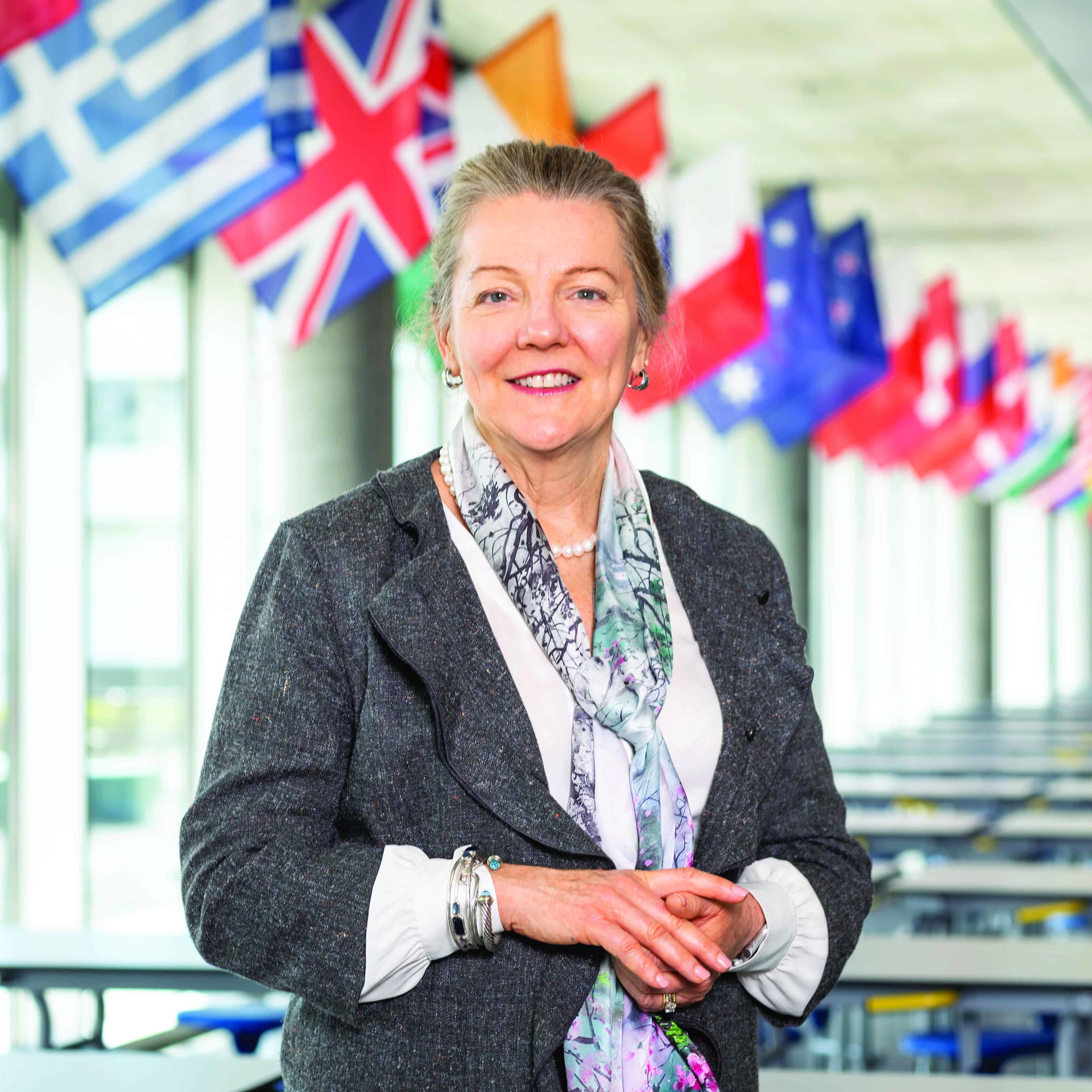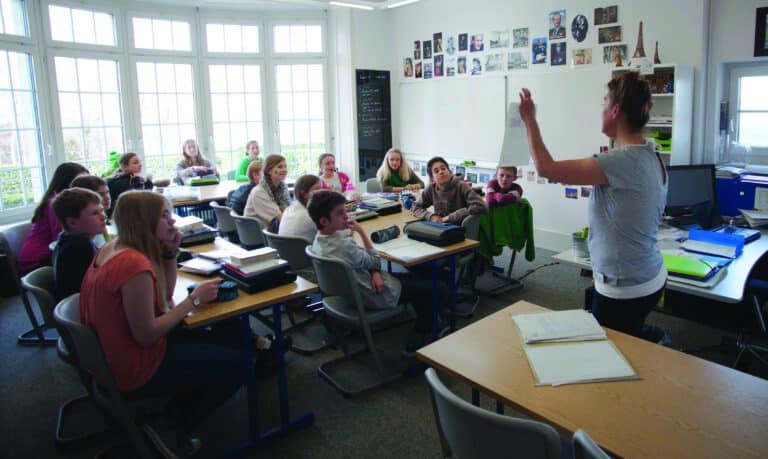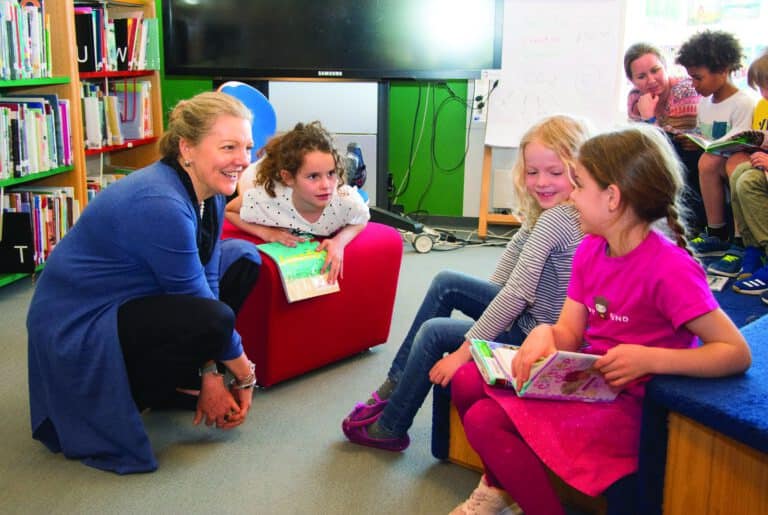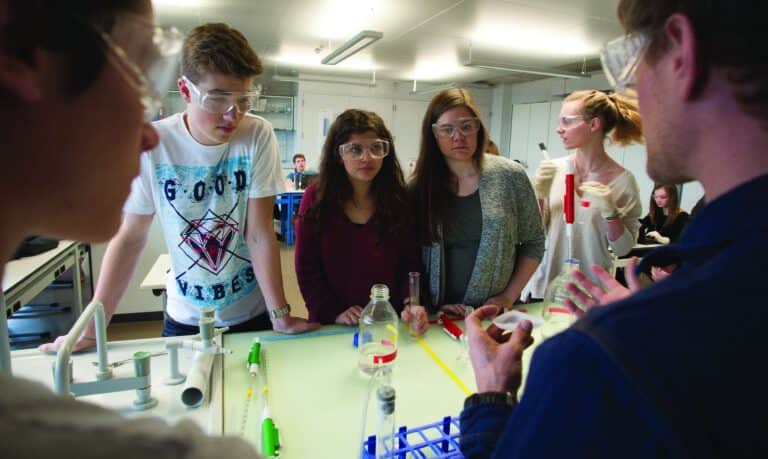Meet the Headteachers – Lisa Lyle – Zurich International School

Lisa Lyle is the newly appointed Director of Zurich International School, having previously worked in France and the USA. International School Parent Editor Nick Gilbert talks to Lisa about her own experiences in education, what makes international schools special, challenges in the future of education, and some of her personal passions.
Your career in education has spanned multiple countries, taking you all over the world to teach and run schools. What made you become a teacher in the first place?
Like many people, I backed into teaching. I was in graduate school pursuing a masters and PhD in French literature and to be able to afford that luxury I had to teach. I didn’t know that I was going to fall in love with teaching, but when I was teaching at
the University of Pennsylvania as part of my doctoral work, I realized that I loved the teaching part of my job more than the research.
As I was finishing my degree, a local independent school asked if I would teach French for them part-time, as I wrote my dissertation – it seemed like a perfect match! I never did finish my doctorate, but I did fall in love with independent and international schools, where a whole community of adults is organized around the single purpose of creating transformative learning experiences for every child.
There was nothing about my personal experience – a tiny public school in East Texas where no one went to college – that prepared me for being part of these amazing schools. To this day, I feel so lucky to have spent my career in schools like ZIS, and I’m so grateful that my own children have had these experiences. I believe every child in the world deserves this kind of education – unfortunately it is simply not available to everybody. The key difference from what I have observed with international and independent schools is that we have the time and the budget to explore the particular interests of the child more closely, whether that means finding them an extra book on a topic of their interest, or seizing learning moments that stray from an endorsed curriculum. In really good schools, we teach children, not curriculum, and we have educators who are capable of differentiating the learning pathway for each child. In these schools, everyone is similarly committed to providing great education and to fostering passion, inquiry, curiosity and a quest for knowledge.
“In really good schools, we teach children, not curriculum, and we have educators who are capable of differentiating the learning pathway for each child.”

Has your own education meant that you find the international school setup even more fantastic?
My educational journey through high school was more impoverished than the one we provide at this school. I certainly floated to the top of my educational community and I had teachers that were kind, generous and supportive, but I wasn’t in an environment where it was normal for everyone’s parents to have gone to college, or even to be curious, well traveled and multilingual.
In college and graduate school, however, the world became larger. I had a bit of a wandering spirit and took off at 18 and hitchhiked around Europe. Because of the effect that travel and further education had on me at this time, the schools I’ve chosen to be part of as an adult place global experiences and personal intellectual development at the core. I would say that because I wasn’t exposed to that during my schooling, I thoroughly appreciate the importance for students as early as possible.
How do you get students to be the best academically, in sports, or the arts in this environment?
I believe most people function best in an environment of high challenge and low threat. Whether it’s working in a new medium, using a new computer platform, or learning a new language, it’s important to be challenged in an area that you’re interested in. So, children need conditions that allow them to experiment, to fail, and do stuff that’s hard for them, which means they’ll be compelled to improve. It’s like hitting a tennis ball with someone who is not as good as you are. If it’s too easy, you might do it for a while because you care about the person, but it’s not going to feel very exciting unless you see significant growth on their part (in which case you are in a teacher role), or you are challenged enough that you are motivated to get back out there and improve.
It is also true that the children who find the amazing satisfaction that comes from gorging in areas of interest – whether that’s dinosaurs or construction equipment or art – become better self-motivated learners. Even six-year olds become monogamously obsessed with a subject, want to know all the words and how everything works in relation to it, and then might move onto something else. Often elementary school-age children, for example, have a huge concern for sustainability, animal welfare, and animals that are at risk of extinction. As long as the topic helps them to think critically and develop curiosity, it can serve as the hook to nurture important stronger skills, for example, in research, presentation, and writing.
Children, of course, don’t develop at the same time across all disciplines. Sometimes because of such an obsession, they will leapfrog over their peers because they’re studying on YouTube or they’re reading voraciously. Ideally, schools engineer for those experiences and know their students well enough to encourage them to lean into their own passions.
Research in education has grown exponentially, and today we know a lot more about what constitutes highly effective teaching and what compels learning. We know that children learn best when they’re in a learning relationship with adults and with each other, and when they care about what they’re learning about.

What do you find particularly special about the teaching process at ZIS?
Our teachers are very reflective about their teaching practice. They know that their professional obligation is to optimize learning for every child. The focus has shifted from, “This is how I teach” to, “This is how children learn and it’s my job to foster the conditions for learning.” Our teachers are willing to take risks and try different approaches. It has definitely evolved from my school days, when if you got a good teacher you were lucky, and if you had a bad teacher you had to just live with it.
These days students have access to a lot of information, sometimes more information than adults, because they’ve been doing interesting research. We encourage this curiosity, and teach our students to be respectful but engaged actively in the conversation. It is clear that the students at our school have great relationships with their teachers.
Apart from the amazing campuses and beautiful facilities, what makes ZIS special for students?
During the interview process for this job, I was lucky enough to be interviewed by a number of students at the school. To a student, they were all multicultural and had lived and traveled in a variety of contexts and spoke multiple languages. They were well prepared, and their questions were insightful and probing. They were respectful but diligently curious. As they spoke with each other they would reference what another student had said earlier, showing they were good listeners and compassionate. Those were great interviews!
On meeting our students, it was immediately clear to me that they are comfortable with adults. When I asked them what they valued about the school they all seemed to love their teachers. They were the product of a school environment where there’s significant respect between adults and children, yet they weren’t too deferential.
It’s not a school that works on the basis of “come to school, go home”; students are very engaged and deeply value the extra-curricular experiences that complement the academic day. It’s great that this is the case, as busy kids make for happy, engaged, vibrant kids.
Because of the central location and the network of international schools, the students are actively engaged all over the place, for example, to do academic competitions and educational trips in Madrid, Stockholm, Prague, to name just a few. They have a close relationship with a school in Ghana, which one of our teachers set up, and every child is aware of, has fundraised for, or done service for the school in Ghana, which is fantastic.
What do the parents of ZIS value about the school?
Parents want their children to be prepared to make an impact in the world, wherever they are. Particularly in this international context, parents themselves have lived globally and they anticipate their children will do the same. They want their children to feel happy, safe, loved, and known. That’s something parents talk about in relation to ZIS with great excitement, pride, and appreciation.
At international schools, just like in many independent schools in the US and elsewhere, parents themselves are often very successful professionally, highly motivated, and well remunerated. They naturally have big ambitions for their children. At the same time, there is anxiety that entry into the most competitive institutions is increasingly elusive, no matter how high grades are or how well prepared the student is. It is part of our job to try and keep a good balance and perspective in relation to this situation and achieve the best outcome for the individual. Fundamentally, we know parents want their children to pursue whatever future it is their children aspire to.
“The key difference from what I have observed with international and independent schools is that we have the time and the budget to explore the particular interests of the child more closely, whether that means finding them an extra book on a topic of their interest, or seizing learning moments.”
What are your personal ambitions for the students at ZIS?
I hope that every student leaves the school excited about learning and with sufficient foundational knowledge and skills to continue learning effectively at whatever the next chosen place is. For some kids that will be EPFL, for others that will be at Harvard, and others it will be military service.
Whatever they do, we hope they will have developed a self-awareness that allows each to know what they’re passionate about, what they want to pursue, what gives them satisfaction, how to show up best for that and manage any anxieties that come with ambition or high expectations. We also want them to be able to self-regulate and be compassionate towards others.
Our focus is to help them develop their appetite to think critically, and their ability to navigate different kinds of information, process it, and present it in different ways. This is going to be very important in the modern world.
What’s the most exciting prospect for you about leading ZIS?
My goodness, there’s so much! I’m really excited about being in an international community and teaching children with such a global perspective. These kids are influenced by how widely they have traveled. They’re interested and eager to think about things in new ways. The same is true about the teachers, many of whom have taught at international schools elsewhere, and have perspectives that will inform the choices we make about the curriculum and other areas.
In the very first year, the focus will be on coming to know the community and involving everyone in a strategic planning effort, starting with many conversations in small and large groups to see which issues precipitate out. Through this process, the school leadership team and the board will identify the most pressing imperatives for the next chapter of our work together. Personally, I am excited about talking to all of these people and hearing about their deeply held aspirations!
Tell us a bit more about you and your family life. How old are your children?
My own children are 27, 30, and 32 and all live in the United States – two in California and one in Chicago, Illinois. They are all at interesting places in their lives. We’ve been lucky to travel a lot together and they have all had a lot of global experiences – we hope to have time to travel with them around Europe while we are here and I’m looking forward to them visiting. My husband is retired and is here with me, living in Switzerland.
What are your hobbies?
Aside from languages and traveling, I love cooking international food. In my kitchen, you will find everything from fish sauce to chili powders and tortillas – a full range of things really.
We are pretty serious hikers. Although, I’m not sure we qualify as serious hikers in Switzerland or at least not yet. We enjoy long vigorous walks! These beautiful long days with all the accessible outdoor activities are such a treat.
I also read widely and love music, art and architecture.
“In order to foster collective inquiry we have to frame questions in a way that leaves open all sorts of possibilities, doesn’t shut down thinking or make certain things off limits for discussion.”
Do you have any personal goals for the next 10 years?
Well, certainly we will have completed A2 level German by October.
I want us to travel throughout Europe, Africa, and Scandinavia – we’ve spent a lot of time in Western Europe, but to be so close to Prague or Croatia is awesome. We want to spend as much time as possible in the natural world. If we were in the Adirondacks, we might have a target for a certain number of peaks to climb, but we haven’t yet figured out a way to measure our hiking here.
Professionally, I’m working to understand how the phrasing of questions impacts an answer. In order to foster collective inquiry we have to frame questions in a way that leaves open all sorts of possibilities, doesn’t shut down thinking or make certain things off limits for discussion. I hope to have time to think about that more and understand how it impacts the education we are providing.

What is the future of education, what are the challenges for children, and how are you helping them deal with these challenges?
That is such a complex question. One of the challenges is to figure out the balance between fostering individual exploration at the same time as reinforcing a shared learning experience.
For so long, educators believed that there was a conveyor belt to put children on at five years old and they exited at 18 to get on another belt for four years. For some children that will be the path that they take. However, for an increasing number of children their interests and access to information cause them to foray into different areas, whether they get obsessed with coding or the xylophone or whatever. They might develop high levels of mastery disproportionate to that of their peers in these areas, meaning their pathway needs to become more differentiated. This challenges a school to create pathways that allow children to leapfrog over the content that’s perceived as appropriate by age if that child has already mastered it. The temptation is to send an advanced child off to do some additional online courses, but it has got to be more individualized than that.
At the same time, schools–especially international schools–have the opportunity to foster individual growth and development, while also preparing students as active agents for positive change within the global community and the communities they will become part of. The exciting opportunity we find in international schools is that we can help each child value his or her own cultural heritage and languages, while ensuring each also learns to be knowledgeable and respectfully curious about the perspectives and experiences of others. Having peers from around the world brings nations and cultures to life in a very real way, and makes for a vibrant learning community.
Another of the biggest challenges we face as schools – particularly in the social media age in which everything is amplified to the extremes – is mitigating anxiety and helping students thrive personally. We need to help students to be present, to understand their emotional and mental states, and to mitigate any problems. There is a remarkable program called a “responsive classroom”, in which educators ask kids questions about their emotions, give them language to use, accept whatever it is they need to share, and help them think about what their options are. We don’t formally have this program at ZIS, but we know we have a responsibility to foster well being alongside academic prowess, and the students at ZIS have an environment that helps develop these incredibly sophisticated tools and skills.
Thank you for your time!
Thank you so much. I wish you all the best.
